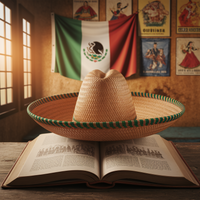Cinco de Mayo: From Historical Victory to Commercialized Celebration
3rd May 2025
Cinco de Mayo always evokes the idea of a party. Though many celebrate by whipping up some Mexican food and sipping Sangria, The history of Cinco de Mayo is often far removed from its modern associations, and some are not happy about it. May 5 commemorates Mexico's 1862 victory over French forces at the Battle of Puebla. While the holiday holds significant historical value, its transformation into a secular drinking day in the United States is largely attributed to strategic marketing efforts by beer companies in the 1980s.
Initially, Cinco de Mayo was celebrated in the U.S. to honor Mexican heritage and solidarity, particularly among Mexican-American communities. However, in the mid-1980s, major beer companies recognized an opportunity to target the growing Latino consumer base. Companies like Anheuser-Busch, Miller, and Coors launched extensive marketing campaigns promoting Cinco de Mayo as a festive occasion centered around drinking, akin to St. Patrick's Day. These campaigns were notably effective, with beer sales during the holiday surpassing those of the Super Bowl in 2022.
Anheuser-Busch and Miller established Hispanic marketing divisions and began sponsoring Cinco de Mayo events to tap into the Latino beer market. Coors invested over $60 million in marketing to Latino consumers during the 1980s. In 1989, the Gambrinus Group, the regional importers of Corona and Grupo Modelo, launched a Cinco de Mayo-themed ad campaign that proved to be a huge success, cementing a link between Cinco de Mayo and Corona beer.
The commercialization of Cinco de Mayo has led to widespread celebrations featuring margaritas, tacos, and festive attire, often overshadowing the holiday's historical significance. This shift has sparked discussions about the commodification of Mexican traditions. Some activists and community leaders advocate for a return to the holiday's roots, emphasizing education and cultural appreciation over consumerism.
While Cinco de Mayo began as a day to celebrate Mexican resilience and heritage, its evolution into a day of cultural celebration reflects the dynamic ways communities adapt and reinterpret traditions. Cinco de Mayo still stands as a testament to resilience, unity, and the enduring spirit of Mexican heritage. While it is a day to celebrate, it's also a day to remember.

